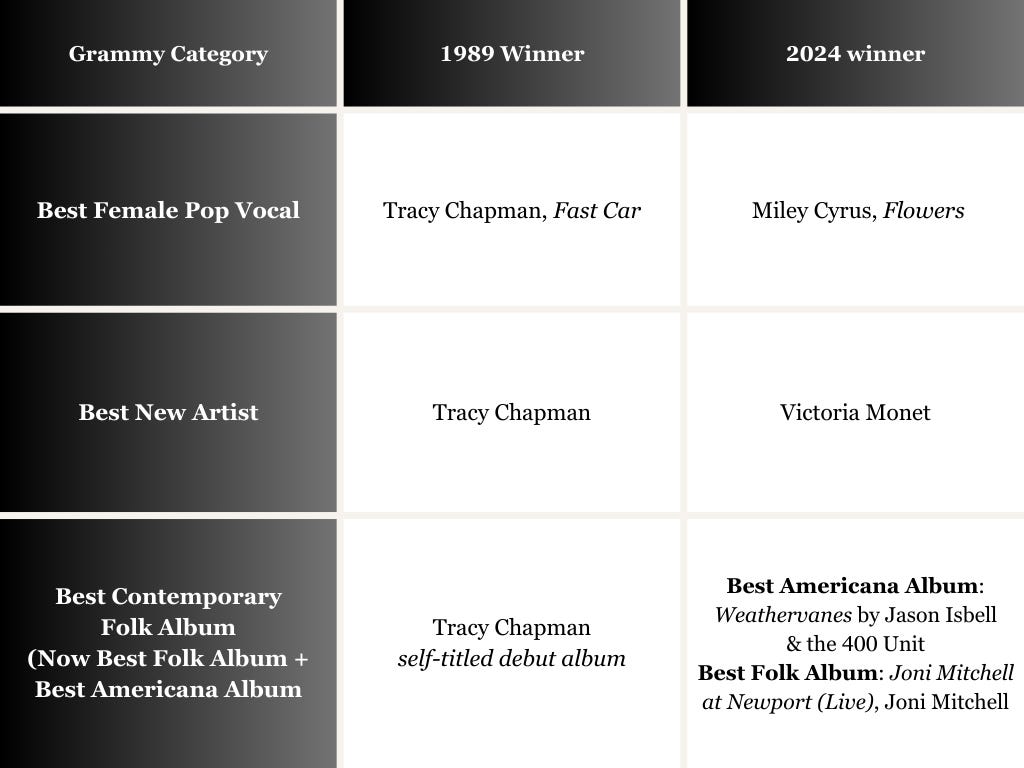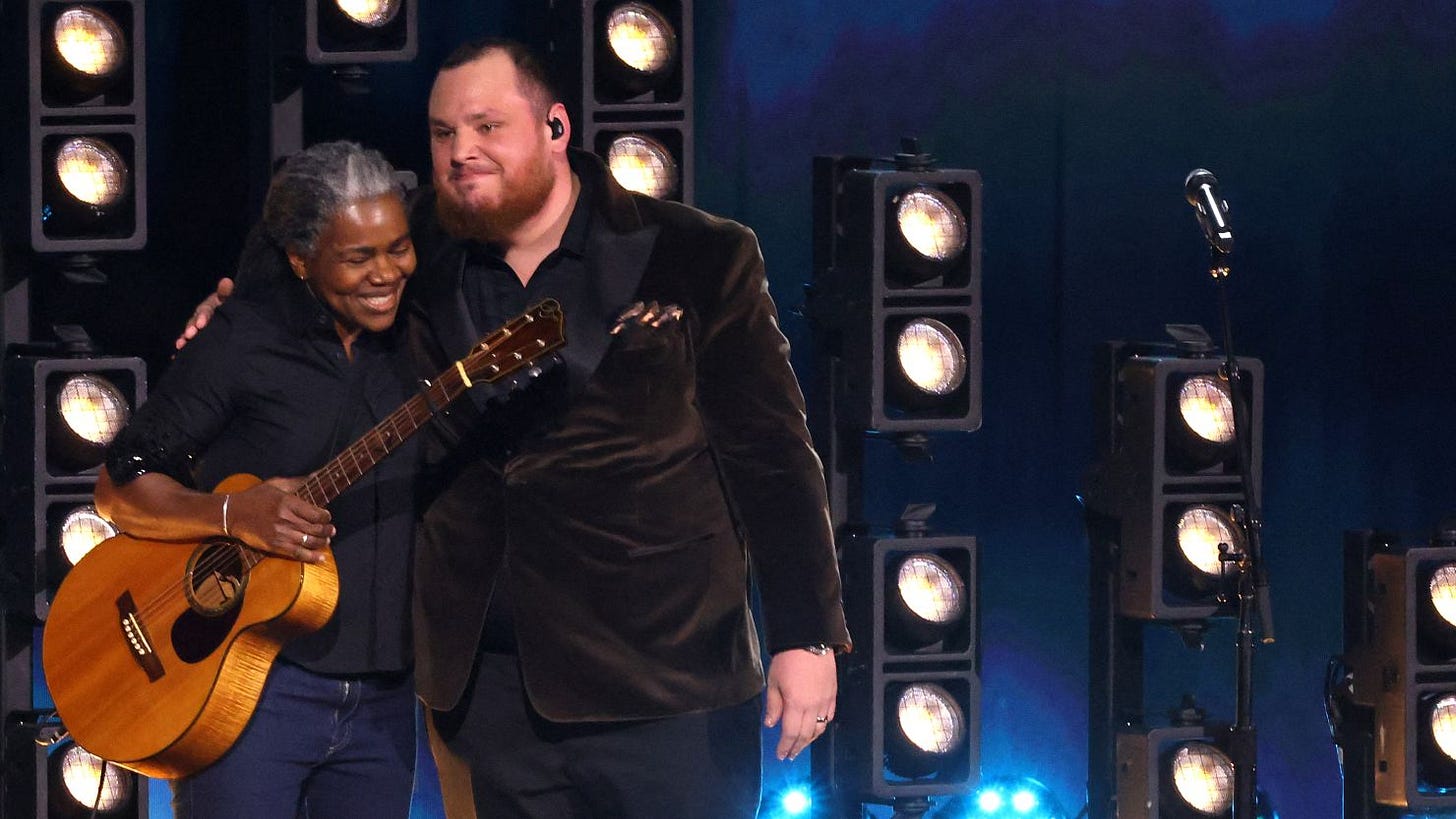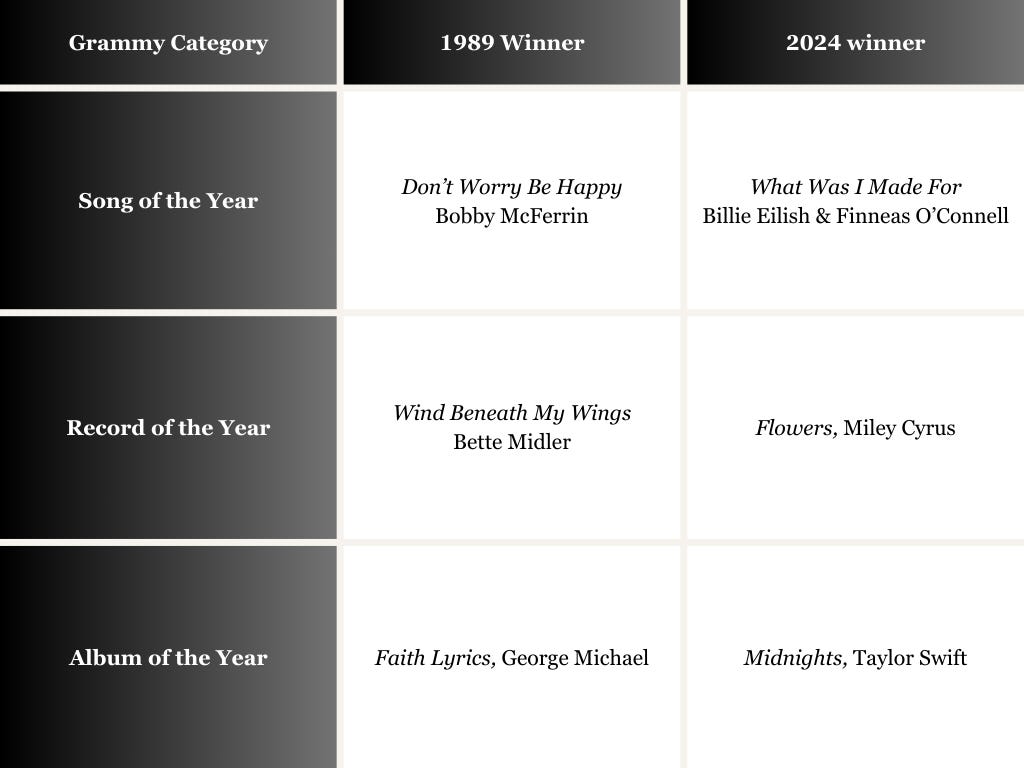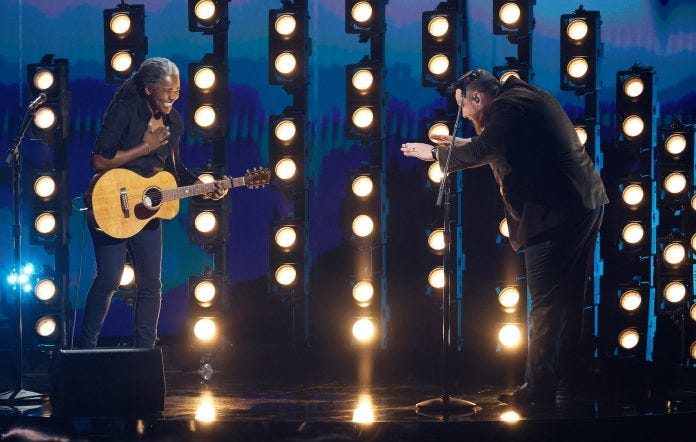The Grammy Performance That Could Remedy What Ails Us.
Last night, Tracy Chapman showed all of us what it means to take a stand without saying a word — but instead, by singing her song.
I recently had a conversation with a friend about how music has changed over the last 30-or-so years — now, many of mainstream songs hitting the charts today are produced and engineered ad nauseam, while the song’s story is often an afterthought. However, prior to the release of autotune in 1997, the focus was less on pitch-perfect vocals; storytelling was at the center of songwriting, while the artist’s vocals were a tool in service of the story. Many of those legends’ voices were raw and gritty, like they were chewing on the human condition, trying to identify its flavor to refine their life’s recipe, and the outcome were songs that expanded our own palates.
Outside of art as pure entertainment or creating beauty for beauty’s sake — equally worthwhile and necessary endeavors — art’s other purpose is exactly that: to help the artist forge meaning, and in doing so, they offer other weary travelers a roadmap to help make sense of our time here as well. Great art reminds us that we aren’t alone — someone else has felt this before, and in their effort to mend their own soul, they mend ours.
When Tracy Chapman released her self-titled debut album in 1988, her song Fast Car took the industry by storm — suffice it to say, she cleaned house at the 1989 Grammy’s, winning Best Female Pop Vocal for Fast Car, as well as Best Contemporary Folk Album and Best New Artist, and she was nominated for Record of the Year for Fast Car, Song of the Year for Fast Car, and Album of the Year.
The Grammy’s began handing out awards for the category Best Contemporary Folk Album in 1987. Chapman was the third person to ever receive that award; since then, winners include John Prine, Emmylou Harris, Bruce Springsteen, Lucinda Williams, Bob Dylan, Tom Waits, Robert Plant and Allison Krauss, among many others.
What sets Chapman apart from her peers is how far she reaches — she is the only artist in Grammy history to win Best Contemporary Folk album and Best Female Pop Vocal. It’s hard to imagine any artist on the planet today winning under those two genres, so juxtaposed as they are.

Further, while Chapman didn’t win for Record of the Year, Song of the Year, or Album of the Year, the contrast between the winners in those categories in 1989 vs. 2024 is sharp.
Chapman is the epitome of what it means to be a true crossover artist, but the essence of her ability to do so can only happen in the context of the time of her debut — a time prior to when we whittled down the human condition into sub-categories by identity: The POC Condition, The LGBTQIA Condition, The Womxn Condition, The Latinx Position. While the world in 1989 certainly wasn’t void of -isms and their impact, there was an understanding of a shared and universal human experience that captured the joys and pains of existence, and our universal desire to transcend circumstance.
And Tracy Chapman’s Fast Car captured exactly those very things — and in the years that followed, that glorious riff continued to capture the attention of all who came within earshot, and its timeless themes continue to capture our shared humanity — including when a young Luke Combs climbed into his father’s pickup truck to drive down the old country roads of North Carolina while Fast Car played on cassette, becoming a soundtrack in the album of his childhood — a memory he holds so dearly that all these years later, he felt the need to cover the song.
This memory, though, doesn’t fit into the accepted narrative created by the Extremely Online today: a white man from North Carolina sitting side-by-side in a pickup truck with his four-year-old son, singing a song written and performed by a (as has been pointed out repeatedly) a “black queer woman.”
Regardless, Combs released his cover of the song in March of 2023, and by July, it went Platinum — and it is only then that it caught the ear of Emily Yahr, leading to her July 13th Washington Post article that intended to kick the hive with her thesis on Combs’ problematic whiteness:
“Although many are thrilled to see ‘Fast Car’ back in the spotlight and a new generation discovering Chapman’s work, it’s clouded by the fact that, as a Black queer woman, Chapman, 59, would have almost zero chance of that achievement herself in country music.”
An argument that can only be categorized as a poor shot in the dark, as Chapman’s Fast Car wasn’t what popular country music sounded like in 1989, and still wouldn’t if released today. Back then, the big headliners included the likes of Randy Travis, George Strait, Reba McEntire, Alabama, and The Judds to name a few. Today, country’s top headliners are Carrie Underwood, Luke Bryan, Lainey Wilson, Morgan Wallen, Jelly Roll, and of course, Luke Combs, among many others — but Chapman’s overall sound is more complex than that. She does not fit into any one specific category, which is why she won Best Contemporary Folk Album, Best Female Pop Vocal, and Best New Artist all in the same year. Her music contains multitudes, as does she.
Regardless, Yahr’s article achieved what it set out to: the mob assembled and set their sights on the latest Bad White Guy, with one of the villagers pitchforking the article’s comment section with:
“It grinds my gears that Luke Combs remade a song that was near-perfect, and now it’s getting a ton of play. Every time I hear the remake, I wish I were hearing the original.”
And herein lies the cultural inflection point: rather just picking up their phone and streaming the original when the urge strikes, instead, these loud, curmudgeonly few choose to utilize their phone in protest — and a kind of silly protest, at that. Covers are not done because artists think they can do it better — they aren’t bug fixes or software updates. When Godsmack covered Led Zeppelin, or Disturbed covered Paul Simon, or Marilyn Manson covered Eurythmics, they did so solely out of respect and love for their predecessor and/or the song, and they bridge the gap across genres and time. It’s safe to say that artists cover music for all kinds of reasons, and it never has to do with outdoing the original artist.
Yet, with Combs’ cover, the mob didn’t see his love and respect for Chapman and Fast Car — so much so there isn’t a word or chord changed in his rendition — but instead, they saw it as a battle between his cis southern whiteness vs. her blackness and gender identity. They were outraged and offended on Chapman’s behalf, who surely must be offended — but what happens when people want to be offended for her, but she isn’t offended? What if she was immensely touched for his cover, because it’s her voice, and she knows that the message of her song has transcended space and time to the point where it’s now not only his voice, too, but also all of ours who sing along and feel that familiar pang in our heart to become more than where we started.
Apparently, that is how Chapman felt about Combs’ cover — in fact, a week before Yahr’s hive-kicking Washington Post piece was published, Tracy Chapman told Billboard, “I never expected to find myself on the country charts, but I’m honored to be there. I’m happy for Luke and his success and grateful that new fans have found and embraced ‘Fast Car.’”
If someone is in need, then by all means, help them. Tracey Chapman, however, is not in need of your help to be offended by something she loves.
Those who are offended by Combs’ cover not only disregard Chapman’s actual-stated-feelings on the topic, but they also inadvertently become the offending party themselves by missing what the song is actually about — and in doing so, their analysis disempowers a song about empowerment and they underestimate the spine and spirit of the woman who penned its lyrics (and they also display how the women of the 80s and 90s wore an entirely different brand of feminism than many of their counterparts today).
While many may hear a sad song about homelessness and tragedy, I hear a song about a woman may not have ended up with the ideal fairytale ending, but did, indeed, accomplish what she set out to — to get away, to become, and to stand on her own two feet, to be the parent to her children that she didn’t have, and to emulate the fortitude of character to rise to meet life’s adversities and heartbreaks rather than succumb to them.
And it turns out that from the outset, she didn’t need her partner, or their Fast Car, to do so.
Meanwhile, no 21st century-manufactured-controversy is complete without an academic’s touch. Widener University’s African American studies coordinator, Richard Cooper, says that these types of conversations are a good thing:
“These kinds of debates, I think, are great because they give an opportunity to raise the larger questions about the fact that, in terms of airplay on largely country stations, you’re not going to see Black women — Black queer women — get that kind of exposure or airplay had they released just the original song. So these conversations are important to have.
Not only does Cooper miss the fact that Chapman didn’t consider herself a country artist then, nor does she now — but he joins the many who argue that black artists haven’t been able to rise to prominence in the genre — and it is in that very argument that they make it clear they haven’t been paying attention to country music of yesterday or today, where greats like Charlie Pride, Lesley Riddle, and even Ray Charles fused country, soul, and blues, and paved the way for those who follow in their footsteps today, such as Kane Brown, Joy Oladokun, The War & Treaty, and Lil Nas X, who all have their own approach to fusing country with other contemporary popular genres.
Having said that, Cooper’s analysis highlights the foundation of our culture today — one that looks for the -isms in the art, and finds them — and then argues that the entire point of the art was the -ism in the first place. And herein we find the Hellscape of our modern era — where art exists solely as a representation of politics, and that debates is the crux of progress.
Meanwhile, Chapman’s position has remained steadfast in her quiet yet resolute disposition, saying nothing more since her July statement to Billboard — until last night at the Grammy’s, where she showed all of us what it means to take a stand without saying a word — but instead, singing her song on stage — doing so with Combs himself, whose admiration for one of his musical heroes was evident all throughout while he looked across the stage, and Chapman, in return, looked back at him and beamed with that extraordinarily kind, gracious smile of hers.
After my husband and I watched their performance, I said to him, “Wow — my god, her voice is still rock solid,” and he responded with, “Yeah, it is — but only now, she sounds more like Tracy Chapman now than she did then.”
Maybe that’s what is supposed to happen — maybe, as we get older, we’re supposed to sound more like ourselves. Maybe the point all along is to become even greater than what our younger selves could imagine they would be while they were working to become us.
And perhaps the remedy our country needs to heal our cultural ailment isn’t more debate — maybe, instead, what we need is for a “black queer woman” and “white cis country boy” to stand on the Grammy stage and sing us a story about beating the odds.
Maybe then, we can once again learn how to do so, too.








